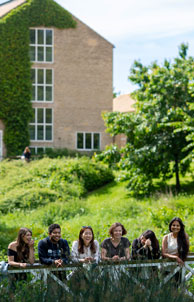PhD programme

Let's stay in touch!
Get information on studying at Aarhus BSS
Sign up and get information about our degree programmes, invitations to online events, and knowledge about living in Aarhus or Herning.
Doing a PhD at the Department of Political Science in Aarhus
Every year, around 10-14 MA students, some from outside and many from our own programme, enter the department’s PhD programme. This is an elite programme, which for several decades has offered students academic supervision, methodology teaching and research training at the very highest level. Our students regularly have articles accepted in excellent international journals, or win awards for ‘best research paper’ at conferences.
All students are assigned two internal supervisors with whom they meet regularly, and who help and support them all through their studies. Students present their work to the department twice – once at the very beginning of the PhD programme, and once towards the end. Students also take a number of compulsory, advanced level courses in research design and methodology (quantitative and qualitative), specifically tailored to suit individual needs. They may also take additional courses elsewhere in Denmark or abroad (subject to departmental approval), and they are expected to present their work at international conferences and workshops.
With some 40 PhD students, the programme is small enough to offer the kind of supportive community where everybody knows each other and share social events such as weekly joint breakfasts, excursions and parties. It is also large enough to ensure real excellence. In addition, it is increasingly international and diverse in terms of students’ nationalities, academic backgrounds, and research topics. The PhD student community is at the very core of the department’s life.
If you excel and work hard in your MA, we offer you the opportunity to apply to the PhD programme. Successful applicants have a relevant, original and realistic project with a well-thought-out research design. They must also have high marks and possess excellent methodological skills. If you think you have a good project, we encourage you to discuss it with relevant professors. Doing so will not guarantee you a place, but it will certainly help sharpen your ideas.
If you are accepted into the programme, all tuition is free, and you will receive a Danish government grant for three years. You will share an office with one or two other PhD students and be affiliated with one of the department’s research sections, which meet up regularly. At Aarhus BSS, being a PhD student also means being a junior colleague of the permanent staff. This means that you are expected to comment on your professors’ papers, just as they comment on yours. You must be present in your office on most days and participate actively in the life at the department, e.g. attend section meetings and presentations by other PhD students. You will also teach or co-teach the equivalent of two courses connected to your research topic and fields of expertise.
The department’s PhD programme covers all the sub-disciplines of political science: comparative politics, international relations, public administration and management, public policy, political sociology, political theory and methods. With some 70 academic members of staff, we are able to offer advanced supervision across a very broad range of topics and methodologies. In addition, students are expected to spend a substantial period of time abroad (often a full semester) at a relevant research institution with specialists in the student’s research topic. Our academic staff members have a wide variety of contacts at other excellent political science departments around the world, and the department will help you arrange your stay.
Our candidates tend to complete their dissertations on time, defend successfully and go on to pursue university research careers or, increasingly, careers with an analytical focus in public or private consultancy both in Denmark or abroad.
If you are interested in applying for a PhD position, please contact the PhD programme director Professor Christoffer Green-Pedersen (cgp@ps.au.dk)